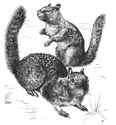Vertebrate Pest Conference: Proceedings

Vertebrate Pest Conference Proceedings: 7th (1976)
Date of this Version
March 1976
Document Type
Article
Abstract
Studies in urban areas have shown that food and shelter are primary environmental factors regulating rodent population growth. These supportive resources can be modified to reduce urban rodent damage; however, widespread adoption of environmental control techniques will require a thorough understanding of rodent-man interrelationships. This study was concerned with what factors should be monitored for making rational ecological decisions on the necessity of rodent management, establishment of priorities, choice of appropriate strategies and evaluation of effectiveness. Guidelines are given for comprehensive monitoring of habitats (social, structural and sanitary factors) and rodent populations (habitat requirements, growth characteristics and zoonosis potential).

